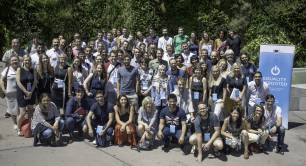EU Social Innovation Competition: 10 finalists announced
Ten finalists have been announced in the 2017 European Union Social Innovation Competition (EUSIC), each competing for three €50,000 prizes awarded by the European Commission.
Half of the finalists originate in either the UK or the Netherlands, with the other five based in Slovenia, Bulgaria, Germany, Spain and Italy.
EUSIC 2017 aims to ‘Reboot Equality’, with competitors pitching and developing products and services that will ensure everyone benefits from technological change.
I hope these projects will inspire others to put their own ideas into action
Almost 800 social innovators from across Europe entered the competition, from more than 40 countries.
The 10 finalists were selected from a shortlist of 30, all of whom attended a mentoring academy in Madrid this July. At the academy the contestants worked with experts to refine their idea, before pitching to a jury with expertise in digital innovation and skills development.
Business ideas range from collaborative solutions to address inequality, to digital employment and skills development for disadvantaged groups.
One UK-based finalist is a worker-owned app for cleaners, with the aim of empowering (predominantly female) cleaners to cooperative, connect to market demand, and increase their wages and share profits.
Mouse4all, a Spanish finalist idea, empowers people with motor disabilities by allowing them to use all the apps in their Android device without touching the screen.
The other finalists were Buildx (UK), CollAction (Netherlands), Basic income currency (Bulgaria), Feelif (Slovenia), Mirrorable (Italy), Power of Language (Germany), SEED (Netherlands), and Signly (UK).
Over the summer, the 30 semi-finalists worked with an individual coach to develop their business plan. The jury have now critically evaluated each business plan and selected the 10 strongest entries.
Anna Sienicka, vice president of TechSoup Europe and member of the EUSIC 2017 jury, commented: “All 10 finalists are fantastic examples of the types of tools, services and models that enable people, regardless of their specific context and environment, to seize the opportunities of the digital revolution.
“I hope these projects will inspire others to put their own ideas into action, and also catalyse new ways of addressing inequality for governments and communities throughout Europe alike.”
Founded in 2012, in memory of the Portuguese politician and social innovator Diogo Vasconcelos, EUSIC aims to help the most innovative ideas to become sustainable projects.
The competition is organised by the European Commission, and supported by Nesta, Kennisland, Shipyard, Impact Hub and Matter&Co.
Three winners will be selected from the 10 finalists and awarded with a prize of €50,000 at the Awards Ceremony on 26 October in Brussels.
Photo credit: European Union Social Innovation Competition


![[file:field_file_image_alt_text]](https://www.pioneerspost.com/sites/default/files/styles/node-teaser/public/images/article/8450135745_78cfa66567_z.jpg?itok=ceTkC3nb)
